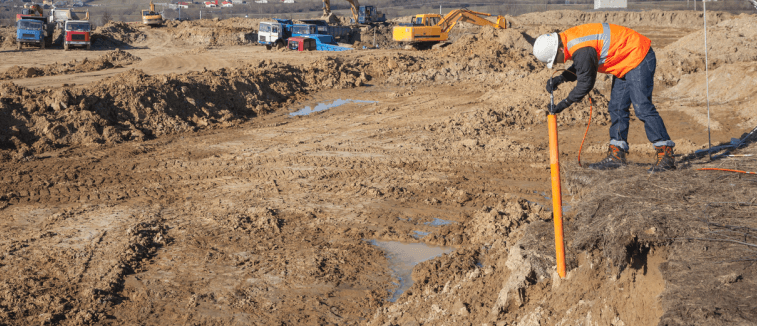Things about Geotheta
Things about Geotheta
Blog Article
8 Simple Techniques For Geotheta
Table of ContentsThings about GeothetaNot known Factual Statements About Geotheta The Main Principles Of Geotheta Geotheta Can Be Fun For EveryoneFacts About Geotheta Revealed

They carry out website examinations, collect examples, perform lab examinations, and analyze data to examine the viability of the ground for construction jobs - Engineer of Record. Based on their findings, geotechnical engineers give recommendations for structure layout, slope stability, preserving structures, and reduction of geotechnical hazards. They collaborate with other specialists, such as architects, structural engineers, and construction groups, to guarantee that geotechnical considerations are integrated right into the overall job layout and implementation
By analyzing the actions and properties of dirt and rock, they can determine possible geotechnical dangers such as landslides, dirt settlement, or slope instability. Their experience aids protect against failings or mishaps that might threaten lives and building. Below are some in-depth tasks and obligations of a geotechnical engineer: Site Examination: Geotechnical designers conduct site investigations to collect information on subsurface conditions.
They interpret the data to comprehend the buildings and actions of the dirt and rock, including their toughness, permeability, compaction qualities, and groundwater conditions. Geotechnical Evaluation and Layout: Geotechnical engineers evaluate the data gathered during website investigations to assess the security and suitability of the website for construction tasks. They execute geotechnical calculations and modeling to examine aspects such as birthing capability, settlement, incline stability, side planet stress, and groundwater flow.
Some Known Incorrect Statements About Geotheta
Structure Design: Geotechnical engineers play a critical role in designing foundations that can securely sustain the designated structure. They examine the soil problems and load needs to determine the appropriate structure type, such as shallow structures (e.g., grounds), deep foundations (e.g (http://peterjackson.mee.nu/where_i_work#c2299)., piles), or specialized strategies like soil renovation. They take into consideration elements such as settlement limitations, birthing capacity, and soil-structure interaction to establish optimal structure layouts
They assess building strategies, screen website tasks, and carry out area assessments to validate that the layout referrals are complied with. If unanticipated geotechnical problems arise, they evaluate the circumstance and give recommendations for remediation or adjustments to the style. Threat Assessment and Reduction: Geotechnical engineers analyze geotechnical risks and dangers connected with the job site, such as landslides, liquefaction, or dirt erosion.

Cooperation and Communication: Geotechnical engineers function closely with other experts included in a job, such as architects, structural designers, and building and construction teams. Reliable communication and collaboration are important to incorporate geotechnical factors to consider right into the general project style and building process. Geotechnical engineers provide technical knowledge, solution questions, and guarantee that geotechnical needs are satisfied.
The smart Trick of Geotheta That Nobody is Discussing
Here are some kinds of geotechnical engineers: Foundation Designer: Structure engineers focus on creating and analyzing foundations for frameworks. They evaluate the soil problems, tons requirements, and website features to determine the most ideal foundation type and layout, such as shallow foundations, deep foundations, or specialized strategies like pile foundations.
They examine the elements influencing slope stability, such as dirt residential properties, groundwater conditions, and slope geometry, and create techniques to stop slope failings and reduce threats. Quake Engineer: Quake designers focus on evaluating and making frameworks to hold up against seismic pressures. They evaluate the seismic threat of a site, review dirt liquefaction possibility, and create seismic design criteria to guarantee the safety and security and durability of frameworks during quakes.
They carry out field screening, collect examples, and evaluate the gathered information to define the soil homes, geologic developments, and groundwater conditions at a site. Geotechnical Instrumentation Designer: Geotechnical instrumentation designers concentrate on surveillance and gauging the behavior of soil, rock, and structures. They install and preserve instrumentation systems that keep an eye on factors such as soil settlement, groundwater degrees, incline movements, and structural displacements to evaluate efficiency and provide very early warnings of potential issues.
Geotheta Things To Know Before You Get This
They carry out tests such as triaxial tests, combination examinations, straight shear tests, and leaks in the structure examinations to gather information for geotechnical analysis and design. Geosynthetics Designer: Geosynthetics designers concentrate on the style and application of geosynthetic products, such as geotextiles, geogrids, and geomembranes. They utilize these materials to improve dirt security, strengthen inclines, offer drain options, and control disintegration.
They often tend to be investigative individuals, which implies they're intellectual, reflective, and curious. They are curious, systematic, logical, logical, and rational. A few of them are likewise social, meaning they're kind, generous, participating, client, caring, practical, compassionate, skillful, and pleasant. Does this audio like you? Take our totally free occupation test to figure out if geotechnical engineer is among your leading profession matches.
In the office environment, geotechnical designers utilize check here specialized software tools to execute computations, develop designs, and evaluate information. They prepare records, evaluation project specs, communicate with clients and group participants, and coordinate job activities. The workplace setup gives a conducive environment for study, evaluation, and cooperation with various other experts included in the task.
Geotheta for Beginners
They frequently visit project sites to carry out website investigations, analyze geotechnical conditions, and collect data for evaluation. These brows through include taking a trip to various places, often in remote or challenging terrains. Geotechnical engineers may perform dirt tasting, conduct examinations, and display building activities to make sure that the geotechnical facets of the task are being carried out properly.
Geotechnical designers additionally operate in specialized geotechnical laboratories. In these facilities, they conduct experiments, do tests on dirt and rock samples, and assess the engineering residential properties of the products. Geotechnical research laboratory engineers function extensively in these atmospheres, managing screening tools, running tools, and recording data. They work together with other lab personnel to make certain exact and reputable testing outcomes.
Report this page